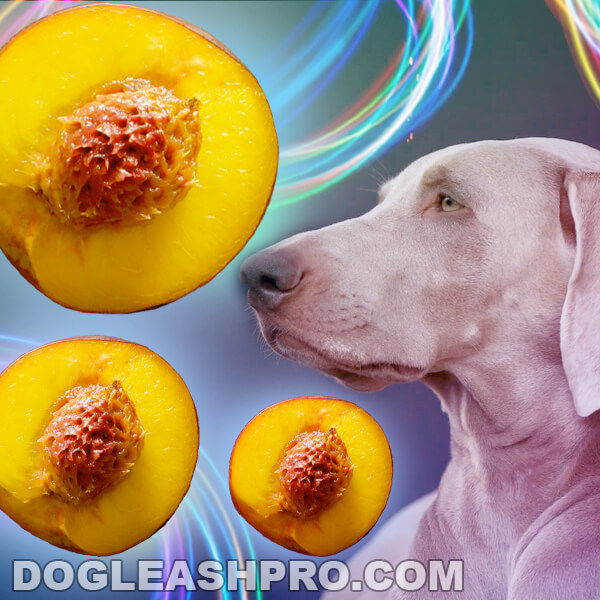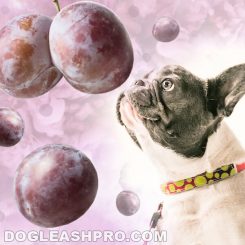
Nectarines are sweet stone fruits that many enjoy adding to their summer dishes like desserts and salads. If you’re eating a Nectarine right now, you’re probably wondering if this refreshing fruit is safe for doggy consumption. Let’s find out!
Can dogs eat Nectarines? Yes, dogs can eat Nectarines in moderation as this nutritious fruit is packed full of vitamins, minerals, and fiber. However, moderation is key because Nectarines are high in sugar. Also, be sure to properly prepare Nectarines before feeding them to your dogs as the Nectarine pit is harmful to dogs and can be a choking hazard.
Table of Contents
Can dogs have Nectarines?
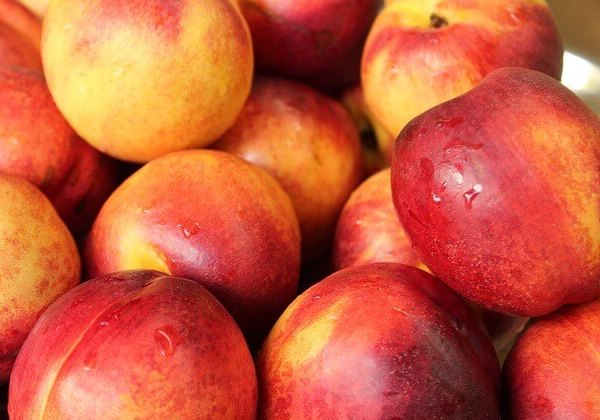
Yes, dogs can have Nectarines in moderation. To learn why Nectarines are a great fruit for dogs, let’s take a brief look at what nectarines are.
What are Nectarines?
Nectarines are sweet seasonal fruit that many enjoy eating during the summer season (or from late spring to early fall).
Many (including myself) sometimes confuse nectarines with peaches and vice versa. Here’s the difference between the two.
Difference between Nectarine and peach
There are two main differences between Nectarine and peach. They are the size and texture. Many argue that the taste between the two is relatively the same: sweet when fully ripe.
Size
When you compare them both, Nectarines are smaller than peaches.
Texture
When it comes to the skin of Nectarines, they are smoother and thinner than peaches. The flesh of Nectarines is also firmer. Peaches, on the other hand, have fuzzy and thicker skin. Their flesh is also softer to chew on.
Now that you know the difference between Nectarine and peach, let’s find out why Nectarines are good for dogs.
Are Nectarines good for dogs?
Yes, Nectarines are good for dogs because this sweet and juicy fruit is chocked full of nutrients like minerals, vitamins, and fiber. This fruit is highly nutritious not only to the dog owners but also to their canine friends.
Many dogs love sweets and an occasional and moderate amount of Nectarine is a sweet treat that will satisfy their sweet tooth.
Nectarines contain magnesium, potassium, vitamin A and C as well as dietary fiber. Let’s discuss how Nectarines can help benefit our canine friends’ health.
Vitamin A helps maintain good eyesight in dogs
Vitamin A is a fat-soluble nutrient that can help your four-legged friends with the following health benefits:
- Good eyesight.
- Proper cell function.
- Healthy immune function.
- Fetal development.
- Overall growth.
Feel free to treat your furry friends to a small amount of Nectarines to receive some of this wonderful vitamin A.
Vitamin C helps reduce aging and inflammation in dogs
An essential antioxidant, vitamin C plays a crucial part in your dog’s health. It looks for harmful free radicals that cause cognitive aging and attacks it. However, since dogs’ livers are able to make vitamin C, many argue that supplementing your dog with this antioxidant isn’t necessary.
We believe that it never hurts to feed your pups a little bit of Nectarines flesh to supplement their vitamin C level. If you feed your K9 friends Nectarines in moderation and as an occasional treat, then it should be fine.
Magnesium produces energy at the cellular level in dogs
Magnesium is an essential macromineral that helps transfers energy and works at a cellular level. It helps to produce energy so that your four-legged friends can move and flex their muscles easily, maintain a normal and steady heart rate or heartbeat, and have proper brain function.
This crucial macromineral is responsible for more than 300 biochemical reactions in the dog’s body. When dogs eat food such as Nectarines that contain magnesium, they will receive the following health benefits:
- Normal nerve function.
- Healthy immune system.
- Strong bones.
- Maintain blood glucose levels.
- Protein production.
- Energy production.
This powerful mineral is also crucial because three other macrominerals depend on the job of magnesium. These three minerals are calcium, potassium, and sodium. Speaking of potassium, let’s discuss this one next.
Fun Fact: Another fruit that is considered a superfruit is Dragon Fruit but is it safe for doggy consumption. Check out Can Dogs Eat Dragon Fruit? to find out!
Potassium helps maintain healthy muscle in dogs
Our canine friends need potassium in their diet because it is not only a mineral but also an electrolyte that is crucial to your furry friends’ health. Potassium is an electrolyte because it is highly reactive with water. When this mineral s hits the water and gets dissolved, it creates positively charged ions, which allows potassium to conduct electricity.
As magnesium is doing its job of transferring energy at a cellular level, potassium ensures that the electrical charges of the muscles, nerves, and health are functioning properly.
To summarize, potassium helps your furry friends with the following:
- Sending nerve signals.
- Help with muscle contractions.
- Regulates fluids in your dog’s body.
With that said, you can provide your pooch with a moderate amount of Nectarines every now and then so they can receive this mineral and electrolyte.
Dietary fiber maintains digestive system health in dogs
Similar to humans, our canine friends need fiber. Fiber is a complex carb and gets fermented in the dog’s large intestine so it takes their body longer to digest than say simple carbs.
The reason why fiber is essential to dogs is that it promotes regular bowel movement and produces stools that are formed and firm. If your canine friends have diarrhea, eating a small amount of Nectarines may help. Consult with your vet first before doing so.
Also, fiber is great for diabetic dogs because it aids in regulating blood glucose levels and reducing fluctuations.
For dogs that are undergoing weight management, eating food and fruit that contains fiber like Nectarines can help with weight loss and assist in managing a healthy weight in dogs. That’s because fiber will helps your furry friends feel full after eating even though the food they consumed is very low in calories.
TLDR: To sum up how fiber can help your four-legged friends, here’s how:
- Promotes healthy digestive tract in dogs.
- Maintain balanced blood cholesterol levels.
- Control your dog’s weight so they can maintain a healthy weight.
- Reduce plaque and tartar accumulation in your dog’s teeth.
- Regulate bowel movements to prevent constipation and chronic diarrhea.
- Eating fibrous food allows your dogs to feel full so they eat less and avoids eating inedible things like spoiled food.
Related Post: Speaking of spoiled food, check out Can Dogs Eat Spoiled Meat? to learn how dangerous it is for dogs to eat spoiled meat.
Are Nectarines safe for dogs?
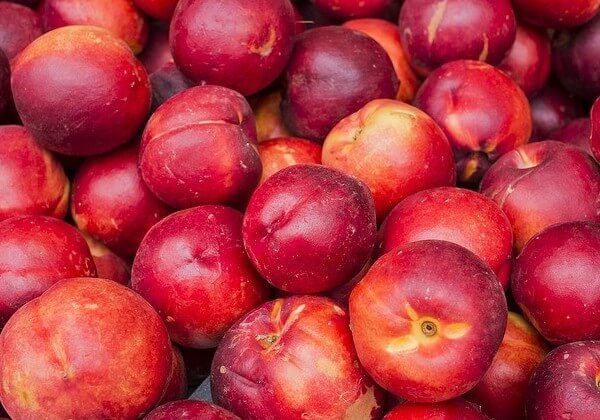
As we can see, Nectarines are safe for dogs. Are Nectarines ok for dogs? Yes, Nectarines are ok for dogs. The nutritional value and health benefits Necatraines offer to dogs confirm that this juicy small fruit is the perfect treat for dogs every now and then.
Are Nectarines bad for dogs?
Yes, Nectarines can be bad for dogs if you feed your furry pals too much of this fruit. Since it is high in sugar content, too much sugar can cause a host of short term and long term health issues in dogs such as:
- Diabetes.
- High blood pressure.
- Dental issues such as cavities, tooth decay, and enamel loss.
- Weight gain.
- Canine obesity.
Since Nectarines are also packed full of fiber, you’ll definitely want to make sure to only give your furry pals a small amount of Nectarines. Ingesting too much fiber can also cause a fiber imbalance in dogs and this leads to uncomfortable symptoms such as getting an upset stomach or frequent diarrhea. Some dogs that consume too much fiber may defecate in the house because of the strong urge to do their business right away.
Not only that, that consuming too much fiber can also make it difficult for the dog’s body to absorb minerals.
For these reasons, please consider feeding the flesh of Nectarines to your four-legged friends in moderation, and should be a special occasional treat every now and then.
There’s also another reason why Nectarines can be bad for dogs. Let’s discuss the Nectarine pits next to see how they can be dangerous to our furry friends.
Can dogs eat Nectarine pits?
No, dogs should not eat Nectarine pits. There are several reasons why dogs should not consume nectarine pits.
Nectarine pit contains cyanide compounds that are poisonous to dogs
Much like other stone fruits, the Nectarine pit contains a compound called cyanide that is toxic to dogs and can cause cyanide poisoning in dogs. Signs and symptoms of cyanide poisoning include:
- Dilated pupils.
- Erratic behavior.
- Excessive drooling due to salivation.
- Difficulty breathing.
- Breathing hard and rapidly.
- Convulsions.
- Paralysis.
If you suspect your dog swallowed a Nectarine pit, be sure to contact your dog’s vet as soon as possible. Cyanide poisoning requires immediate medical attention so your vet may ask you to bring your pooch in for a physical examination or checkup. Your vet will then take appropriate steps to treat your canine friends.
My dog ate a Nectarine pit and is choking, what should I do?
Nectarine pit is about 1 to 2 inches long and thus it can be a choking hazard for dogs if they accidentally swallowed the pit. Here’s what you should do if your dog is choking on the Nectarine pit or any other pit or food:
- Open your dog’s mouth and pull his or her tongue out to the side of the mouth. Make sure the mouth is opened wide.
- With your index finger, move it in a sweeping motion. You’ll want to move it from the side of the dog’s mouth to the center. If you don’t feel comfortable using your finger, try using a needle nose plier or a thin tong to get a hold of the pit and pull it out.
- Perform the standing Heimlich maneuver. With the dog’s back against your stomach with his head up, you’ll want to feel for the soft hollow under his ribs and place your closed fist into it. Then, you’ll want to pull up and in toward your stomach about 3 times. It should look like a thrusting motion.
- When the Nectarine pit is back in your dog’s mouth, have your pooch spit it out.
If the standing Heimlich maneuver isn’t working or your precious pooch is too big or heavy to lift, you’ll want to use the kneeling Heimlich method.
So, are Nectarine pits poisonous to dogs? Yes, Nectarine pits are poisonous to dogs because it contains cyanide and it can even be a choking hazard. Be sure to properly prepare the Nectarines before feeding them to your pups.
You can slice the Nectarines into small bite-size pieces before feeding them to your pups.
Fun Fact: Butternut Squash also contains seeds. Find out whether dogs can eat the seeds in our article, Can Dogs Eat Butternut Squash?
Can dogs eat peaches and Nectarines?
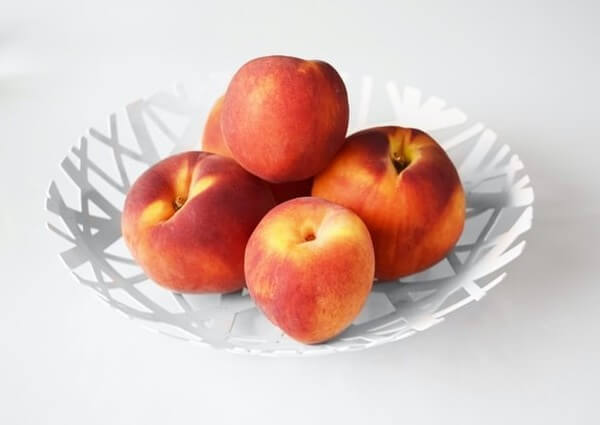
Yes, dogs can eat both peaches and Nectarines, however, it’s best to remove the pits from both the peaches and the Nectarines before feeding them to your canine companions.
Peaches and Nectarines are one of the healthiest types of fruits out there and are definitely safe for dogs to eat. However, peaches are quite acidic, and Nectarines have higher sugar content than most fruits which is why your furry friends can only eat peaches and Nectarines in moderate amounts.
Nectarines are also high in fiber, and having too much fiber can cause them to experience diarrhea and upset stomachs.
Again, when feeding your dog peaches and Nectarines, the center portion of the fruit or the pit must be removed before serving to prevent choking.
Can dogs eat peaches or Nectarines?
Yes, dogs can eat peaches or Nectarines if and only if the pits in these fruits are removed first before eating. Dogs of all ages can eat peaches or Nectarines. Both fruits come from the same family and are generally safe for canines to consume.
Fruits like peaches or Nectarines are alkaline fruits and can help balance the pH level of a dog’s body fluid. Although peaches and Nectarines are not part of a canine’s regular diet, they can be given as a healthy snack from time to time.
Make sure to wash the peaches or Nectarines, and cut them into small slices before letting your four-legged friends eat them.
So, can dogs eat Nectarines?
Dogs can certainly eat Nectarines as this fruit contain fiber, minerals, and vitamins that are helpful to our furry friends. However, it’s important to be aware that our pups should only eat Nectarines in moderation because they do contain high sugar content, and regularly eating this sweet fruit can cause a host of health issues in dogs.
Be extra careful when feeding your dogs stone fruits like Nectarines. The pit or stone is extremely harmful to dogs, not only because of the harmful chemical compound it contains but also it can be a choking hazard. So before you give some Nectarines to your pup, proper preparation is key.
DISCLAIMER: THIS WEBSITE DOES NOT PROVIDE MEDICAL ADVICE
The information, including but not limited to, text, graphics, images and other material contained on this website are for informational purposes only. No material on this site is intended to be a substitute for professional veterinary advice, diagnosis, or treatment. Always seek the advice of your veterinarian or other qualified health care provider with any questions you may have regarding dietary needs.
Resources:
https://www.britannica.com/plant/nectarine
https://www.healthline.com/nutrition/nectarine-vs-peach

With over five years of specialized experience as an animal writer, my expertise lies in dog nutrition, health, behavior, grooming, and training. I am dedicated to delivering helpful and informative content that caters to the well-being of our furry friends. My primary goal is to empower pet owners with knowledge and ensure our canine companions thrive in health and happiness. In my free time, I love volunteering at local dog rescue centers.
